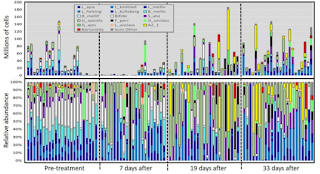A Longitudinal Field Study on the Impact of Non-Native Probiotics and Antibiotics on Honey Bee Gut Microbiome
Introduction:
- Probiotics are commonly used in agriculture, including commercial beekeeping, but their effectiveness is not well-supported by evidence.
- Antibiotic treatments in beekeeping can disrupt the gut microbiome, reducing its protective abilities and promoting the growth of antibiotic-resistant pathogens.
Objective:
- Investigate whether non-native probiotics influence the honey bee gut microbiome, disease prevalence, or rescue antibiotic-induced dysbiosis.
Methods:
- The study involved three groups of 25 hives each in a randomized block design.
- Two major commercial probiotics (A and B) were applied monthly for five months in experiment one.
- Antibiotics (oxytetracycline and tylosin) were applied in December in experiment two, followed by probiotic application.
- Various molecular and microscopy techniques were employed to analyze the gut microbiome, pathogens, and fungal abundance.
Findings:
- Probiotic treatment did not result in significant differences in the gut microbiome or disease prevalence compared to control groups.
- Antibiotic treatment significantly reduced gut microbiome size immediately after application.
- The gut microbiome response to tylosin and oxytetracycline differed in terms of composition and membership.
- No significant differences in pathogen levels were observed between antibiotic-treated colonies and controls, except for black queen cell virus (BQCV).
- Probiotics did not accelerate microbiome recovery following antibiotic-induced dysbiosis.
Microbiome Details:
- Next-generation sequencing of the 16S rRNA gene revealed 229 bacterial species from 11,700 unique OTUs.
- The introduced probiotic species were not consistently detected in the worker gut.
- Antibiotic treatment significantly influenced gut microbiota variation over time, with distinct responses to tylosin and oxytetracycline.
Conclusion:
- The study suggests that the applied non-native probiotics did not provide significant benefits in terms of influencing the honey bee gut microbiome or mitigating the effects of antibiotic treatment.
- Antibiotic treatment had a significant and lasting impact on the gut microbiome, emphasizing the importance of understanding and managing the honey bee microbiome for colony health.
Overall, the study contributes valuable insights into the complex interactions between probiotics, antibiotics, and the honey bee gut microbiome in the context of commercial beekeeping.
- #BeeMicrobiomeStudy, #ProbioticsResearch, #AntibioticsImpact, #HoneyBeeHealth, #GutMicrobiomeDynamics

